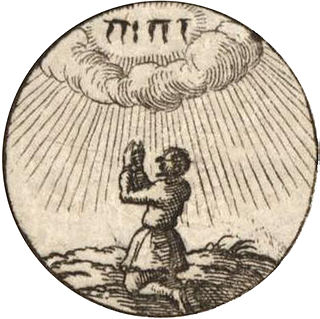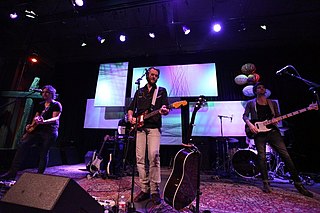Related Research Articles

Philip Tyler Keaggy is an American acoustic and electric guitarist and vocalist who has released more than 55 albums and contributed to many more recordings in both the contemporary Christian music and mainstream markets. He is a seven-time recipient of the GMA Dove Award for Instrumental Album of the Year, and was twice nominated for a Grammy Award for Best Rock Gospel Album. He has frequently been listed as one of the world's top-two "finger-style" and "finger-picking" guitarists by Guitar Player Magazine readers' polls, and due to his complex and virtuosic playing, he is widely regarded as one of the greatest guitarists of all time.

The priesthood of all believers is either the general Christian belief that all Christians form a common priesthood, or, alternatively, the specific Protestant belief that this universal priesthood precludes the ministerial priesthood found in some other churches, including Catholicism and Eastern Orthodoxy.

An agape feast or lovefeast is a term used for various communal meals shared among Christians. The name comes from the Greek word ἀγάπη (agape), which implies love in the sense of brotherly or familial affection.

Contemporary worship music (CWM), also known as praise and worship music, is a defined genre of Christian music used in contemporary worship. It has developed over the past 60 years and is stylistically similar to pop music. The songs are frequently referred to as "praise songs" or "worship songs" and are typically led by a "worship band" or "praise team", with either a guitarist or pianist leading. It has become a common genre of music sung in many churches, particularly in charismatic or non-denominational Protestant churches with some Roman Catholic congregations incorporating it into the Mass as well.

In Christian theology, justification is the event or process by which sinners are made or declared to be righteous in the sight of God.

"Love Divine, All Loves Excelling" is a Christian hymn by Charles Wesley, first published in 1747. It was initially published as part of his Hymns for Those that Seek and Find and quickly became a central hymn in both Methodist and wider Christian worship. The hymn reflects Wesley's teachings on Christian perfection, expressing a longing for God's transforming and sanctifying grace.

Daniel Laurent Schutte is an American composer of Catholic and contemporary Christian liturgical music, best known for composing the hymn "Here I Am, Lord" and approximately 171 other hymns and Mass settings.

The communion of saints, when referred to persons, is the spiritual union of the members of the Christian Church, living and the dead, but excluding the damned. They are all part of a single "mystical body", with Christ as the head, in which each member contributes to the good of all and shares in the welfare of all.

As a general term in theological use, assurance refers to a believer's confidence in God, God's response to prayer, and the hope of eternal salvation. In Protestant Christian doctrine, the term "assurance", also known as the Witness of the Spirit, affirms that the inner witness of the Holy Spirit allows the Christian disciple to know that they are justified. Based on the writings of St. Augustine of Hippo, assurance was historically an important doctrine in Lutheranism and Calvinism, and remains a distinguishing doctrine of Methodism and Quakerism, although there are differences among these Christian traditions. Hymns that celebrate the witness of the Holy Spirit, such as Fanny Crosby's "Blessed Assurance", are sung in Christian liturgies to celebrate the belief in assurance.

Peter John Kreeft is a professor of philosophy at Boston College and The King's College. A convert to Catholicism, he is the author of over eighty books on Christian philosophy, theology and apologetics. He also formulated, together with Ronald K. Tacelli, Twenty Arguments for the Existence of God in their Handbook of Christian Apologetics.

A Christian burial is the burial of a deceased person with specifically Christian rites; typically, in consecrated ground. Until recent times Christians generally objected to cremation and practiced inhumation almost exclusively. Today this opposition has all but vanished among Protestants and Catholics alike, and this is rapidly becoming more common, although Eastern Orthodox Churches still mostly forbid cremation.

Richard Connolly was an Australian musician, composer and former broadcaster. A well travelled man, who had studied broadcasters and broadcasting in numerous countries including France, Italy and German under the Churchill Fellowship program. He had a long association with the Australian Broadcasting Corporation, as a writer/composer for radio and television programs, but also wrote for documentaries and films.
Jan Michael Joncas is a Catholic priest of the Archdiocese of Saint Paul and Minneapolis, liturgical theologian, and composer of contemporary Catholic music best known for his hymn "On Eagle's Wings".

Mike Aquilina is an American Catholic author and journalist working in the area of Church history, especially patristics. He is co-founder of the St. Paul Center for Biblical Theology, a Catholic research center based in Steubenville, Ohio.

"Hail, Queen of Heaven, the Ocean Star" is a Marian hymn written by Father John Lingard (1771–1851), a Catholic priest and historian who, through the works of William Cobbett, helped to smooth the passage of the Catholic Emancipation Act in England.

Wesleyan theology, otherwise known as Wesleyan–Arminian theology, or Methodist theology, is a theological tradition in Protestant Christianity based upon the ministry of the 18th-century evangelical reformer brothers John Wesley and Charles Wesley. More broadly it refers to the theological system inferred from the various sermons, theological treatises, letters, journals, diaries, hymns, and other spiritual writings of the Wesleys and their contemporary coadjutors such as John William Fletcher, Methodism's systematic theologian.

"All Creatures of Our God and King" is an English Christian hymn by William Henry Draper, based on a poem by St. Francis of Assisi. It was first published in a hymn book in 1919.
Peter Raymond Scholtes was a priest, consultant, and author. In the 1960s, as a parish priest and choral conductor, Scholtes wrote the hymn "They'll Know We Are Christians by Our Love" for an ecumenical event.
"Wenn das Brot, das wir teilen" is a Christian hymn, with a text written in 1981 by Claus-Peter März, and a melody by Kurt Grahl. It was written to commemorate St. Elisabeth, and begins with a reference to her Miracle of the Roses. The song, of the genre Neues Geistliches Lied (NGL), is part of German hymnals, including Evangelisches Gesangbuch and Gotteslob, and of songbooks.
References
- ↑ Song Reminds Us of Message of Love That Needs to Be Shared Each Day
- ↑ Lewerenz, Spencer; Nicolosi, Barbara (1 November 2005). Behind the Screen: Hollywood Insiders on Faith, Film, and Culture. Baker Books. p. 50. ISBN 9781585582716.
- ↑ The Ancient Star-Song: PETER SCHOLTES